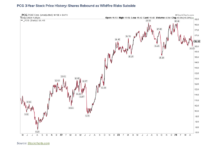 There are many causes for performance anxiety which can leave a new trader with too much fear to trade with focus. And this fear often sends them out of the markets with the 90 percent that did not make it. This fear can arise from past losses that were so big and traumatizing that a trader can’t bear the potential of repeating a mistake like that with all the emotions tied to the previous failure. A new trader gripped with performance anxiety can even get a valid entry signal but focus solely on the potential for loss rather than the potential for gain.
There are many causes for performance anxiety which can leave a new trader with too much fear to trade with focus. And this fear often sends them out of the markets with the 90 percent that did not make it. This fear can arise from past losses that were so big and traumatizing that a trader can’t bear the potential of repeating a mistake like that with all the emotions tied to the previous failure. A new trader gripped with performance anxiety can even get a valid entry signal but focus solely on the potential for loss rather than the potential for gain.
A trader that is afraid to lose money can’t trade because even the best traders spend a good part of their time being wrong and cutting losses early. The good losses in trading are either tuition in your early years or the cost of doing business inside a robust system in your later years. The bad losses are big and are usually the result of the new trader not doing adequate homework so the markets take that new trader to school. These big losses not only hurt the new trader financially but can be traumatizing mentally and emotionally causing a loss of faith in themselves and their system.
More than anything trading is a mental game. And if your thoughts are not right then it likely won’t end well. However, if you have your psychology right about trading then nothing can stop you. A trader must have the ability to point at the target and pull the trigger in the moment when it is time. We must accept the risk and reach for the reward. Here are five tips to make that a possibility, while keeping performance anxiety at bay:
- A trader can only build confidence to take a real time trade after they have done the homework necessary in back testing through multiple market environments to understand the probabilities of success and failure. Understanding how the markets have behaved with past price patterns can give traders the boldness they need to push the buy/sell button on their broker’s screen.
- Understanding the price level to set your stop loss on a trade and setting a potential price target for getting out will give you a good idea of the risk and reward dynamics of your trade setup. It is easier to trade when you know that you are risking $100 for a chance to make $300 and the odds are on your side with a great entry.
- Structuring your position sizing so that if your stop is hit you will only lose 1% of your total trading capital will eliminate much of your fear of failure. The urgency and importance of any one trade should be converted into a calming assurance that the current trade is just one of the next one hundred trades. You can overcome the majority of performance anxiety around trading when you simply trade in small enough position sizes so that any one trade or a series of trades will not affect your long term trading success.
- Trading what you know and are familiar with will also lower your stress. Trading a chart pattern, stock, or index that you have traded for years is familiar territory. Also trading markets inside your circle of competence instills confidence. Only trade futures, options, stocks, bonds, forex, and indexes that you understand. Many traders drown chasing unfamiliar waterfalls.
- A lot of performance confidence comes from having a detailed trading plan including what you will do before the market opens and the faith in yourself to execute that plan while the market is open. Knowing that your decisions will be based on the facts will allow you to rise above anxiety and instead operate with faith in yourself and your system. Being able to focus on the price action will keep emotions and ego out of your trades.
Thanks for reading.
Read more from Steve on his blog NewTraderU.
Twitter: @SJosephBurns
Any opinions expressed herein are solely those of the author, and do not in any way represent the views or opinions of any other person or entity.







